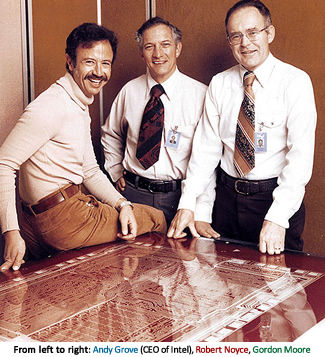Robert Noyce, co-creator of what we know today as the microchip, was honored today by another one of Google's whimsical doodles. Other noteworthy individuals celebrated recently by Google have been Marie Curie, Diego Rivera and Mark Twain.
Despite his share of setbacks, Noyce had an interesting and fulfilling career as a Silicon Valley pioneer, including a fundamental role as a co-founder of Intel. He was well known for his "casual atmosphere" management style, giving employees and co-workers latitude, lending an ear when needed and being involved personally with the lives of those he worked among. The atmosphere in many tech companies today is said to echo his unusual, down-to-earth approach.
Noyce missed an opportunity early in his career involving the first evidence of quantum tunneling, a quirk of quantum mechanics which is still accounted for in today's modern processors. Noyce had written a complete description of the "tunnel diode" nearly a year and a half before a Japanese scientist, Leo Esaki, had finished and published his own work on the same topic. However, in 1956, Noyce's boss discouraged him from publishing his findings and Esaki was credited for the discovery. Ultimately, Esaki received a Nobel prize for his work on tunnel diodes. Noyce was said to have been irritated with himself for not being more public with his work.
In 2000, Jack Kilby won a Nobel prize for his contributions to the microchip that Noyce helped him co-invent. Noyce is widely credited for solving some fundamental issues with Kilby's design, including an improvement which allowed them to be massed produced more easily. Unfortunately, Noyce died before the Nobel committee decided to award Kilby for their ground-breaking work. Nobel prizes are not awarded posthumously.
Noyce died on June 3, 1990 at the age of 62 in Austin, Texas.
